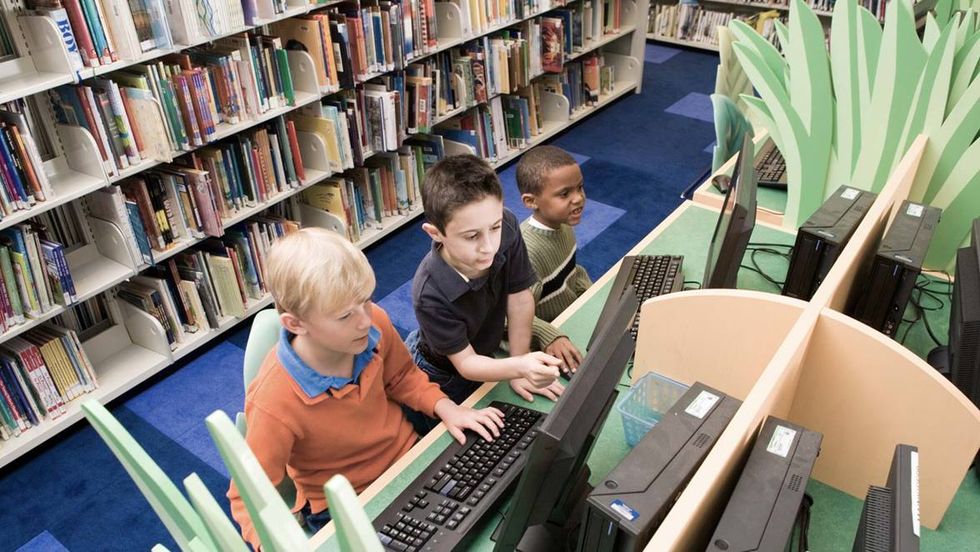Picking on "the education system" is in vogue now. The classroom is modeled after a factory line, we say. Every student must process the material at the same pace, even if nobody's brain learns at the same pace. Surely, then, the solution is surely to harness the wondrous power of data-driven algorithms to mold the curriculum into a unique plan for everyone.
I've had this conversation with many progressive friends, all beaming with confidence in the wisdom of this bold step forward. I wonder how they'd react to find out this solution is supported by Betsy DeVos.
To be fair, some evidence in favor of "personalized learning" has found better measurable outcomes. But even so, I'm convinced the drawbacks would be immeasurable. Education writer Alfie Kohn lists a few — the denial of real personal autonomy in learning, the behaviorist model of fact instruction, the "teach to the test" mentality that education reformers insist they oppose - but from my experience, I can see some more.
At its core, personalized learning atomizes learners. The answer to every problem lies between the student and the computer; gone are collaborative problem-solving and synergy of ideas among peers. If those ideas sound like empty buzzwords to you, consider Paul Tough's description of a Japanese math classroom:
"In Japan, teachers would introduce a new mathematical method — let's say, adding fractions with different denominators, like 3/5 + 1/2 — by presenting the students with a problem they'd never seen before and instructing them to figure it out on their own. Students would stare at the problem for a while, scratch their heads, sometimes wince in pain, and then come up with an answer that was usually wrong.
Next would come a series of discussions, in small groups and in the class as a whole, in which students compared and contrasted their solutions, arguing and lobbying for different approaches. The teacher would guide the discussion in a way that led, eventually, to a new element of math understanding (in this case, the principle of finding the lowest common denominator). Often the correct solution would be proposed not by the teacher but by one of the students. The whole process was sometimes bewildering and occasionally frustrating for students, but that was kind of the point. By the end of class, confusion and frustration gave way to the satisfaction of a new depth of comprehension, not delivered in whole cloth by an omniscient adult, but constructed from the ground up, in part through a dialogue among students."
That sure sounds more enriching — and more engaging! — than the repetitive worksheet-based math classes we know in America, let alone the customized repetitive practice that a computer program would spit out.
I shared this with a friend who spoke in favor of personalized learning, and his answer was that not everyone would understand how to add fractions at the same time. They could receive many options, from a video to an interactive computer program to a workbook, to figure it out for themselves. True, but why do that? This method proves cheaper, simpler, and ultimately effective. Through a personal, rather than personalized, process, everyone's contribution either laid the foundation for what not to do or what to do when adding fractions. Everyone mattered; everyone learned from his or her participation.
Atomization of learners would not only reduce learner's intellectual enrichment, though. It would also rob them of the valuable social enrichment that schools offer. As Neil Postman puts it, "the idea of a school is that individuals must learn in a setting in which individual needs are subordinated to group interests" — after all, "you cannot have a democratic —indeed, civilized — community life unless people have learned how to participate in a disciplined way as a part of a group."
That's why I'm especially concerned about personalized learning's inevitable foray into the special education classroom. Teachers won't have to bother trying to understand students' different neurotypes if the algorithms can come up with a perfect lesson plan. If that happens, students' social needs will be neglected.
Young adults who've spent their youth at a computer screen with little experience working with others will find themselves unprepared for employment. Perhaps employment with computers will be an appealing accessible option, but the field's becoming ever more competitive. Those who prove capable of politely interacting with bosses and constructively communicating with colleagues will be chosen over others with equal computer ability every time.
If we want students in special ed to be meaningfully employed for their abilities, rather than their disabilities, we must empower them with real social skills - not just what's encoded into a social skills curriculum, but the kind that develops organically through real-world trial-and-error personal interaction.
In short, as fascinating as "personalized learning" may sound, we must recognize the great benefits of learning as a whole class — the benefits we take for granted. Is a rise in test scores truly worth a reduction in genuine intellectual and social engagement? It all depends on where our priorities lie.
I sure know that when I get to share my thoughts with my peers, and in turn, get to hear perspectives I've never considered, I feel empowered. My brain's totally switched on and ready for whatever will come its way. When I have to learn something for school all by myself, on the other hand, the material may interest me, but ultimately, I'm just doing it to get it done with.
Not everyone feels the same way, of course. If we believe that schooling has a much greater intellectual and social purpose than merely passing on facts to our youth, though, we must reject the atomization that comes with the pie-in-the-sky ideal of personalized learning.



















